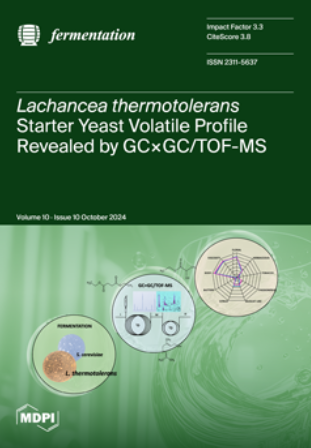Cheese Fermented with Human-Derived Limosilactobacillus reuteri DSM 17938 and Mushroom Powders: A Novel Psychobiotic Food with Enhanced Bioactivity and Sensory Acceptability
IF 3.3
3区 农林科学
Q2 BIOTECHNOLOGY & APPLIED MICROBIOLOGY
引用次数: 0
Abstract
Fermented foods containing psychobiotics are of growing interest among food scientists. Human-derived Limosilactobacillus reuteri DSM 17938, a gut symbiont and potential psychobiotic strain, has been shown to exhibit the following health benefits: anti-inflammation and GABA-production capacity, as well as modulation of pathogen and cancer cell growth. The aim of this research was to develop an acid-coagulated fresh soft quark-type cheese, fermented with L. reuteri DSM 17938, with enhanced bioactivity, sensory acceptability, and overall likeability. Psychobiotic-containing cheeses represent the food of a new generation, so it is of great importance to gain the trust of the consumers. To develop a familiar taste, cheese samples were enriched with mushroom powders of Agaricus bisporus and Pleurotus ostreatus. A high abundance of lactic acid bacteria was maintained in all cheese samples (>log 7.64 CFU/mL), while cheese extracts exhibited cytotoxicity to colon cancer cell line HCT116 (up to 30.96%) in vitro. Additionally, cheese samples provided a favorable medium for the growth of the probiotic Escherichia coli Nissle 1917 (>log 7.11 CFU/mL). Sensory evaluation revealed high scores for all samples (up to 97.21% of maximum overall quality). The survey conducted in this study offered insights into consumer willingness to try products containing psychobiotics. This study demonstrates the potential for the successful development of fermented food products with L. reuteri DSM 17938, which exhibits all the desired traits that consumers may receive well. Further research is required to explore the potential health benefits of these innovative food products.人源路氏乳杆菌DSM 17938和蘑菇粉发酵干酪:一种具有增强生物活性和感官可接受性的新型精神生物食品
食品科学家对含有精神生物物质的发酵食品越来越感兴趣。人类来源的路氏乳杆菌DSM 17938,一种肠道共生体和潜在的精神生物菌株,已显示出以下健康益处:抗炎和GABA产生能力,以及调节病原体和癌症细胞生长。本研究的目的是开发一种用路氏乳杆菌DSM 17938发酵的酸凝新鲜软夸克型奶酪,该奶酪具有增强的生物活性、感官可接受性和整体喜爱性。含精神活性成分的奶酪代表了新一代的食品,因此获得消费者的信任至关重要。为了形成熟悉的味道,奶酪样品富含双孢蘑菇和平菇的蘑菇粉。在所有奶酪样品中都保持了高丰度的乳酸菌(>log 7.64 CFU/mL),而奶酪提取物在体外对结肠癌细胞系HCT116表现出细胞毒性(高达30.96%)。此外,奶酪样品为益生菌大肠杆菌Nissle 1917的生长提供了有利的培养基(>log 7.11 CFU/mL)。感官评估显示,所有样本的得分都很高(高达最高总体质量的97.21%)。这项研究中进行的调查为消费者尝试含有精神生物药物的产品的意愿提供了见解。这项研究证明了使用路氏乳杆菌DSM 17938成功开发发酵食品的潜力,该乳杆菌展示了消费者可能会很好地接受的所有期望特征。需要进一步的研究来探索这些创新食品对健康的潜在益处。
本文章由计算机程序翻译,如有差异,请以英文原文为准。
求助全文
约1分钟内获得全文
求助全文
来源期刊

Fermentation-Basel
BIOTECHNOLOGY & APPLIED MICROBIOLOGY-
CiteScore
3.80
自引率
18.90%
发文量
594
审稿时长
7 weeks
期刊介绍:
Fermentation-Basel is an international open access journal published by MDPI, focusing on fermentation-related research, including new and emerging products, processes and technologies, such as biopharmaceuticals and biotech drugs. The journal enjoys a good reputation in the academic community and provides a high-impact forum for researchers in the field of bioengineering and applied microbiology.
 求助内容:
求助内容: 应助结果提醒方式:
应助结果提醒方式:


